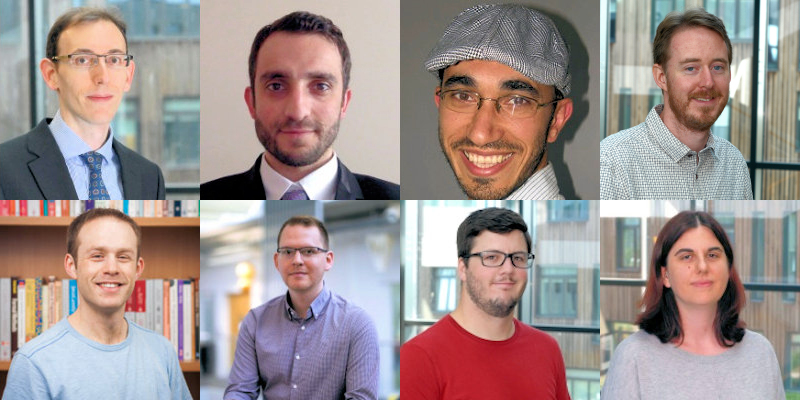
Our early career researchers
The department has a number of academic staff who are in the early stages of their careers - either within eight years of their PhD award or within six years of their first academic appointment.
Dr Simos Gerasimou
Dr Simos Gerasimou is an Assistant Professor at the Department of Computer Science since 2019. His research interests are in engineering trustworthy software for autonomous systems through the development of rigorous tool-supported approaches using model-based analysis, simulation and formal verification. His areas of expertise include safe AI, software engineering for AI and AI for software engineering, model-driven adaptive and autonomous systems, and assurances for autonomous systems. He is the Scientific Director and York PI of the ERC H2020 project SESAME (https://www.sesame-project.
Dr Ian Gray
Dr Ian Gray is an early career researcher and lecturer in Real-Time Systems. He studied for his PhD at York and became a lecturer in the Department in early 2018. He works on the development of new programming models: new ways of thinking, computationally, about complex real-time and embedded systems, the types of systems that are embedded in cars, smart homes, and mobile phones.
Ian developed his research through close collaboration with industry, and participating in a number of large research projects funded by the European Union. He is also engaged in supervising PhD students whose research crosses the boundary between software and hardware.
Dr Patrik Huber
Dr Patrik Huber joined the University of York in 2019 as a Lecturer in Computer Vision and Machine Learning. His interests are in Computer Vision, Computer Graphics & Machine Learning. More specifically:
- Statistical 3D models, especially 3D face models;
- Metrically accurate 3D face avatars from 2D images and videos;
- Combining model-based, classical computer vision with deep learning approaches.
He also has a keen interest in Modern C++ (C++14/17 and beyond).
Dr Jo Iacovides
Dr Jo Iacovides is an early career researcher who joined the Department in Spring 2018 as a lecturer in Human-Computer Interaction (HCI). Her research interests lie in HCI and Educational Technology where she investigates learning within the context of games and playful technologies. She has previously explored how people learn to use technology in the workplace, how digital games and tools support informal learning and the use of digital games in formal education. More recently, she has been working on a project investigating game-based learning for police training in child interviewing, where engagement in the context of safety critical games has been studied. She also supported the development of Resilience Challenge, a game that is designed to introduce the concept of organisational resilience to healthcare practitioners.
Dr Alan Millard
Dr Alan Millard studied for his PhD in Computer Science at the University of York, and rejoined the Department in October 2021 as a lecturer in the Real-Time and Distributed Systems research group. His research in swarm robotics and multi-robot systems primarily focuses on fault tolerance (detection, diagnosis, and recovery), with the aim of engineering systems capable of achieving long-term autonomy in challenging environments. He is also interested in the development of open-source software and hardware that facilitates research and education in this area.
Dr Peter Nightingale
Dr Peter Nightingale joined the department in 2018 as a lecturer in Artificial Intelligence. His main research interest is in constraint programming (CP), an area of AI that deals with modelling and solving combinatorial problems (for example in logistics, configuration, planning, and scheduling). Within CP, his main focus is on automating the techniques used by expert modellers to produce models that will work well with a given target solver (of which there are several types). He has also worked on constraint solving techniques, and has contributed to a constraint solver that was among the best performing at the time. Before joining York Peter was a postdoctoral research fellow at the University of St Andrews, working on EPSRC projects covering high-performance solving and automated modelling of constraint problems.
Dr Siamak Shahandashti
Dr Siamak ("Sia") Shahandashti joined the department in 2017 as a lecturer in cyber security & privacy, His research interests include applied cryptography, web security & privacy, and usable security & privacy. Sia has worked on designing verifiable electronic voting systems in which voters can verify that their ballot has been cast as intended and public auditors can verify that the cast ballots have been recorded as cast and tallied as recorded. More recently, Sia has been working on the security and usability of key fingerprint verification methods, like those used in WhatsApp 'security codes', and designing privacy-enhancing technologies for the web and digital services.
Dr Steven Wright
Dr Steven Wright joined the University of York as a Lecturer in 2018. He has worked in High Performance Computing for over a decade, particularly in the areas of performance analysis, benchmarking and simulation. Before joining the University of York, he was a postdoctoral research fellow at the University of Warwick working with UK AWE and Sandia National Laboratories (NM) on the Computational Collaborative Project in Plasma Physics [EP/M011534/1].
Much of Steven’s recent research has been focussed around the design and development of performance portable software for plasma physics applications, in collaboration with the York Plasma Institute, the University of Warwick and the UK Atomic Energy Authority (UKAEA).
